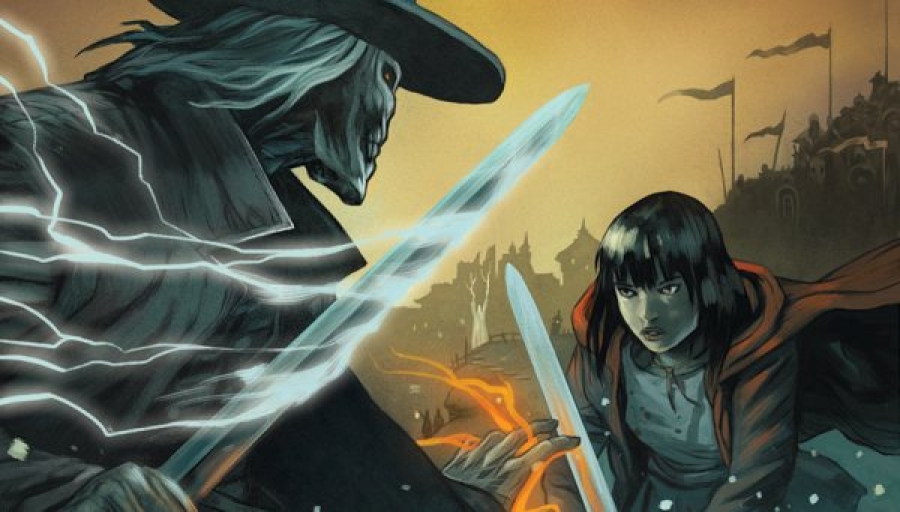Writer and artist Peter Bergting’s The Portent: Ashes is simple and elegant. It’s like a dream where you only remember bits and pieces and maybe a few broad strokes, but it still fits together and is effective due to the overarching, ephemeral idea of the dream. Bergting’s first original graphic novel, Domovoi, was one of the first books I ever reviewed, and his artistic style and relaxed storytelling was unlike anything else I had read or seen, until now. At once lush and desolate, Bergting creates a world that is both familiar and completely unknown and then moves his characters through that world with a kind of violent beauty. Lin, a wood nymph who has been gone for a long time, wandering and searching for the one thing she believes will return meaning to her life, returns to the world she once knew, and, in a way, this is her story. The characters, at first glance, represent familiar fantasy tropes, such as the fearless heroine, the wise mentor, and the young warrior, but through Bergting’s unique storytelling, he adds depth and dimension to these characters, layering them with a multitude of mysteries and a mythical history. Much of that history comes from shared experiences, but the way each of the characters responds to that experience is completely different, making for a rich, lived-in past. The past echoes loudly in Lin’s ears, everyone whispering their disappointment, and she can feel the sense of failure and regret weighing down on her shoulders. The Portent: Ashes is steeped in the past, a past that haunts the present and swells with regret and irrevocable choices.
It is impressive that Bergting actually keeps his fantastic story small. He never slips into over-the-top, senseless action for no reason. All the action here is driven by motivation, even if that motivation may be hidden from us. His story unfolds with a causal ease, with an everyday kind of feeling which belies the elaborate story he has laid out. This story is not driven by plot, but rather by characters, and it is a wonder to float along with Lin and her companions as she struggles to untangle the present from the past and to make decisions that are true to herself, all while trying to look ahead to the repercussions of different choices. This is an incredibly objective tale, so much so that right and wrong may seem obvious, but that all depends on whose point of view you’re looking at the situation from, because everyone’s beliefs are shaded by their experiences. There is a powerful melancholy that hangs over the characters, imbuing the surroundings with a faded beauty, and Bergting’s art gorgeously brings to life a world that has lost nearly all hope and teeters on the brink of destruction, due as much to external forces as to internal ambivalence and selfishness. Bergting chooses to show more than he tells, the dialogue acting as a roadmap as the quiet and intense visual story unfolds, heavy with subtext and emotion.
Bergting somehow tells a story that, even though it is all about time, seems to feel timeless, beginning, middle, and end all blending and blurring together. Each character is in a different place in the same story, and each moment means something unique to each of them, making it nearly impossible for Lin to decipher anyone’s true intentions, including her own. If this sounds abstract, that is because it is, and gloriously so, as Bergting has created a fantasy world that is based on abstraction and mystery and individual choices. Each of the characters’ choices has had a hand in shaping this world, and their future choices will either save or destroy it. Unlike where characters are the result of their surroundings, in this world the surroundings are the result of the characters, and that is an insanely creative and downright magical idea. And, that is what makes The Portent: Ashes so remarkable. It is based on ideas, ideas that can mean completely different things to different people, just like they do in real life, and it is about the search for truth and for peace, a search that Bergting knows is never truly over, and perhaps has only just begun.

